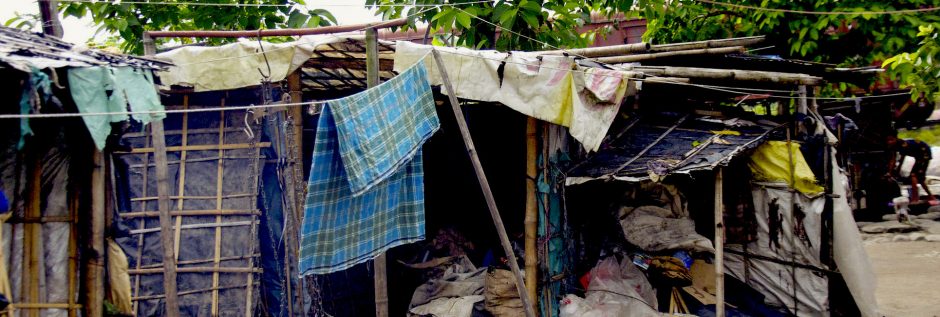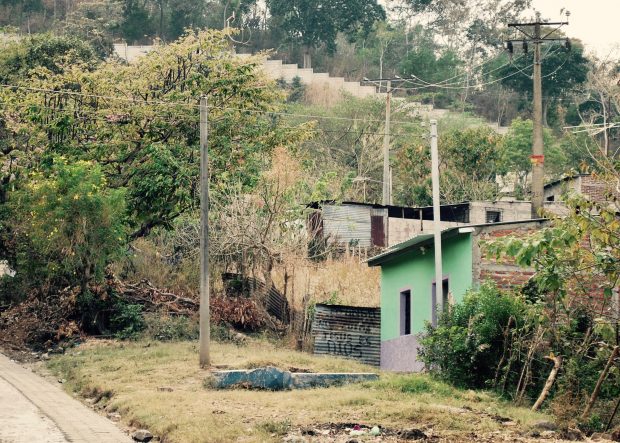If you wish, you can hear the sermon as it was preached from the UCJ pulpit. Simply click the play button below:
Delivered at the United Church of Jaffrey
July 23rd, 2017
Late in the afternoon one of the old women wiped her forehead with a rag and announced that it was time to walk over to the well.
A handful of us gathered out on the gravel road and pretty soon the old woman came out, and with no ceremony at all, headed off down the hill.
We were in a shantytown about an hour outside of San Salvador.
Until that moment, the windows of the van tinted our view of El Salvador
But now, as we picked our way along the outskirts of the slum, all of our protective screens dropped away,
and we walked into poverty.
An old man hacked at some firewood with a machete.
Skinny chickens darted here and there among the palms.
A fetid rivulet of waste curdled in the crook of the road.
We were eight students from Yale Divinity School.
We’d been reading and discussing the classics of Liberation Theology all semester, and while our intellectual engagement with Gutierrez, Sobrino and Ellacuria had been enlightening, it was not till we walked on the margins, that we began to feel, in our gut, how lived poverty effects real people.
How strange it is!
According to the United Nations nearly half the population of the world – some 2.8 billion people, live on the equivalent of less than 2 US dollars per day.
And yet, in spite of this reality – in spite of the vast numbers of hungry people living in squalor, we – the privileged few – live our lives from day to day with almost no awareness of reality of poverty.
Global capitalism is a surprisingly good at keeping poverty out of sight.
*
In the eighth chapter of the second epistle to the Corinthians epistle, the Apostle Paul tells the Corinthians about the community in Macedonia – using the Macedonians as an example of generosity. Paul writes:
We want you to know, brethren, about the grace of God which has been shown in the churches of Macedonia, for in a severe test of affliction, their abundance of joy and their extreme poverty have overflowed in a wealth of liberality on their part.
Did you catch that last sentence?
Reading — or in this case, listening — to Paul, it’s easy to lose yourself in the rhythm of his rhetoric and lose track of the extraordinary complexities he casually throws at you.
Allow me to read it again:
in a severe test of affliction, their abundance of joy and their extreme poverty have overflowed in a wealth of liberality on their part
A severe test of affliction…
Okay…
Abundance of joy?
What?
Extreme poverty.
Okay…
Overflowed in wealth?
What?
I’m confused.
Since when does a “severe test of affliction” lead to “abundance of joy?”
How can “extreme poverty” yield “wealth of liberality?”
This is no kind of cause and effect I’m familiar with.
I’m confused – but I have to say – I love it.
I love the way the Bible serves up little gems like this – turns of phrase that make us think, precisely because they reveal a world view so radically different from our own.
Biblical scholars tend to explain away moments like this – they provide historical and cultural frames try to resolve the peculiarity of the text.
I’m not going to pick a fight with Biblical scholars.
What they do is very valuable indeed –
But I’ve found, that for what I do…– that is, trying to find the spiritual value of the text – is often better served by lingering for a while inside the confusion.
It’s a bit like going to a different country.
You can intellectualize the many historical and cultural reasons why Salvadorans act the way they do, but it is, I submit, altogether more wonderful – that is, full of wonder – to occupy yourself, while in San Salvador, experiencing the peculiarity – and insodoing discover the truths revealed about both El Salvador and your home.
So what about this peculiar statement of Paul’s?
Reading it, it is impossible not to be immediately aware that the sentiment expressed is the exact opposite of the sentiment that prevails in capitalist America of 2017.
Capitalism is powered by the assumption that abundant joy is the direct result of material comfort.
This is the implicit message of all advertising.
Lite Beer creates fun.
Toothpaste whitens teeth making you irresistible.
This car is stylish and luxurious.
This house has 3 bedrooms and a hot tub.
Material comfort is profitable – which, I would say, is the direct opposite of “Severe test of affliction.”
The words “severe test of affliction” does not make good ad copy.
Likewise, in our time the notion of a “wealth of liberality” is something we attribute to philanthropists – people whose enormous financial assets allow them to give money away in buckets.
Needless to say, someone living in “extreme poverty” is the last person we expect to exhibit a “wealth of liberality.”
*
Earlier in the day, after we prayed together, and they fed us lunch, the old woman had told us the story of the well.
There had been a time, she said – a few short years before—when the hard decision that each family in the neighborhood faced each day could be summed up in three words “frijoles o agua” — “Beans or water.”
None could afford both.
Potable water was available only in bottles from the market.
Imagine that… imagine if each day began with that decision:
Is today a day when we will eat?
Or is today a day when we will drink?
A cooperative of women formed around the idea of digging a well.
Success seemed daunting. They would have to find the land. They would have to find a way to finance the purchase of a pump and the electricity to run the pump.
The women experienced many setbacks.
A local man donated a small piece of land as a site for the well, but then reneged under pressure from the Mayor who opposed the initiative.
The women staged a demonstration that publically shamed that man into re-instating the gift.
Local gangs who controlled the area got wind of the project and began to extort the women with threats of violence – slowing down their fundraising.
But none of these challenges deterred the women. Such resistance was to be expected. They knew how to handle it.
And everyone – even their detractors understood the singularity of their purpose that was contained in the one compelling word that was their rallying cry:
“Agua!” “Water!”
These women knew suffering and deprivation. Their bodies showed the evidence of having born many children.
For 12 years – from 1979 to 1992, they’d endured El Salvador’s horrific civil war. Their clothes were worn, and their hair, tied back, escaped in wisps at their temples.
Coming out of the kitchen, wiping their hands on their aprons – these women, care-worn and stooped with age, did not look like the leaders of a social movement.
They did not look like the living legacy of liberation theology in action.
And yet, that is what they are–undoubtedly.
In their struggle, these impoverished women showed remarkable resilience.
Astonished fortitude. True faith.
Always with an eye to the well-being of the community, these impoverished women exhibited the most critical “wealth of liberality.”
They fought for water!
Agua!
*
When our reading from Paul’s 2nd Epistle to the Corinthians continues, the apostle persists in offering the Macedonians as an exemplar of generosity:
For they gave according to their means, as I can testify, and beyond their means, of their own free will, begging us earnestly for the favor of taking part in the relief of the saints— and this, not as we expected, but first they gave themselves to the Lord and to us by the will of God. Accordingly we have urged Titus that as he had already made a beginning, he should also complete among you this gracious work.
In very Paul-like fashion, the apostle corrects himself saying, first, that the Macedonians gave according to their means, and then saying – no actually, they gave “beyond their means, of their own free will, begging us earnestly for the favor of taking part in the relief of the saints—
This would be a wonderful text to use for a Stewardship Sunday. I have no doubt it has been used that way…
But lets not.
In the sentence that follows, Paul says: “first they gave themselves to the Lord …”
Continuing, as we have done thus far, to frame this passage in terms other than collecting money– in terms, rather, of ultimate value like water, for example – this phrase – “first they gave themselves to the Lord” powerfully orients us.
And again, we can return to the slums of San Salvador to illustrate the ultimate value of this phrase.
*
When we reached the well, we gathered around it.
At present, the woman told us, the cooperative only makes enough money, selling pastries and grinding corn, to run the pump three times a week.
The pump fills the tank, and the water flows through pipes that fill the cisterns in each house in the area. The cisterns contain enough potable water to serve each house until the next day the pump runs.
When she was done speaking she smiled and folded her hands.
Someone asked her a question.
I have long since forgotten the question, but I will always remember the answer she gave.
She told us that after all the years of struggle, to acquire the land, get the appropriate permits, bribe the right people, and plan a working system, the women were ready to dig the well. When the day came, the community gathered at the spot and prayed.
At that moment, she said –when they were about to start digging…
at that moment they did not know if there would be water under the ground at that spot.
What?!
When she saw how shocked we were, the old woman just smiled.
Of course!
How silly of me to assume they had access to the equipment necessary to verify the presence of an aquifer.
Still, the possibility of failure must have been so terrifyingly close at hand!
That was the piece of land that they had fought for. That was the only piece of land they had. There was no other piece of land to choose from.
And then she said:
“We put a shovel in the ground in the name of God…”
I was astounded.
Could there be a more divine act than this – a more steady and intent focus – regardless of the possibility of failure – on a matter of ultimate value?
“We put a shovel in the ground in the name of God.”
In light of these words, Paul’s peculiar words have a new and profound sense:
in a severe test of affliction, their abundance of joy and their extreme poverty have overflowed in a wealth of liberality
These weary old women, standing in a field in their stained aprons and tired smiles—these harried mothers, these embodiments of liberation theology, had utter faith in the liberality of God.
God, they knew, is not the God of beans or water
God is the God of beans and water
El Dios de frijoles y agua
Amen


